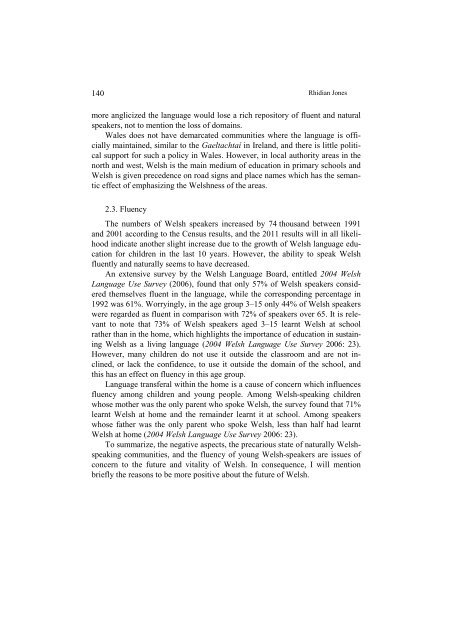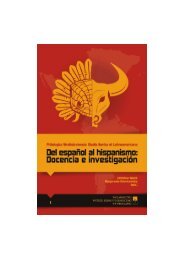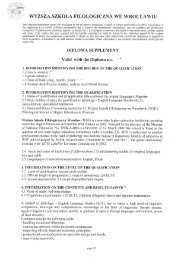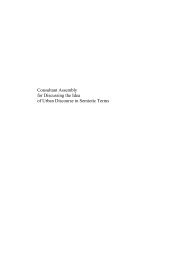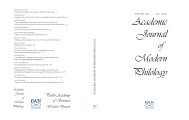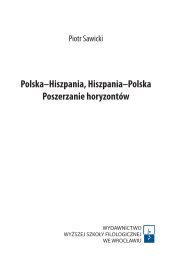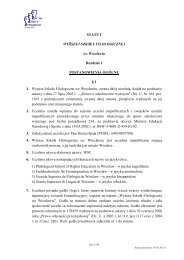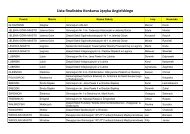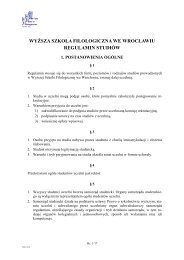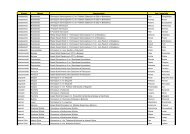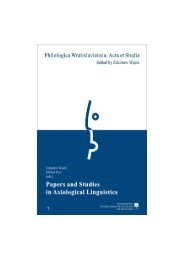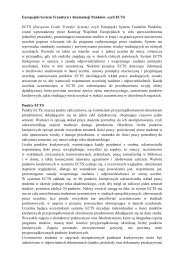s - Wyższa SzkoÅa Filologiczna we WrocÅawiu
s - Wyższa SzkoÅa Filologiczna we WrocÅawiu
s - Wyższa SzkoÅa Filologiczna we WrocÅawiu
Create successful ePaper yourself
Turn your PDF publications into a flip-book with our unique Google optimized e-Paper software.
140<br />
Rhidian Jones<br />
more anglicized the language would lose a rich repository of fluent and natural<br />
speakers, not to mention the loss of domains.<br />
Wales does not have demarcated communities where the language is officially<br />
maintained, similar to the Gaeltachtaí in Ireland, and there is little political<br />
support for such a policy in Wales. Ho<strong>we</strong>ver, in local authority areas in the<br />
north and <strong>we</strong>st, Welsh is the main medium of education in primary schools and<br />
Welsh is given precedence on road signs and place names which has the semantic<br />
effect of emphasizing the Welshness of the areas.<br />
2.3. Fluency<br />
The numbers of Welsh speakers increased by 74 thousand bet<strong>we</strong>en 1991<br />
and 2001 according to the Census results, and the 2011 results will in all likelihood<br />
indicate another slight increase due to the growth of Welsh language education<br />
for children in the last 10 years. Ho<strong>we</strong>ver, the ability to speak Welsh<br />
fluently and naturally seems to have decreased.<br />
An extensive survey by the Welsh Language Board, entitled 2004 Welsh<br />
Language Use Survey (2006), found that only 57% of Welsh speakers considered<br />
themselves fluent in the language, while the corresponding percentage in<br />
1992 was 61%. Worryingly, in the age group 3–15 only 44% of Welsh speakers<br />
<strong>we</strong>re regarded as fluent in comparison with 72% of speakers over 65. It is relevant<br />
to note that 73% of Welsh speakers aged 3–15 learnt Welsh at school<br />
rather than in the home, which highlights the importance of education in sustaining<br />
Welsh as a living language (2004 Welsh Language Use Survey 2006: 23).<br />
Ho<strong>we</strong>ver, many children do not use it outside the classroom and are not inclined,<br />
or lack the confidence, to use it outside the domain of the school, and<br />
this has an effect on fluency in this age group.<br />
Language transferal within the home is a cause of concern which influences<br />
fluency among children and young people. Among Welsh-speaking children<br />
whose mother was the only parent who spoke Welsh, the survey found that 71%<br />
learnt Welsh at home and the remainder learnt it at school. Among speakers<br />
whose father was the only parent who spoke Welsh, less than half had learnt<br />
Welsh at home (2004 Welsh Language Use Survey 2006: 23).<br />
To summarize, the negative aspects, the precarious state of naturally Welshspeaking<br />
communities, and the fluency of young Welsh-speakers are issues of<br />
concern to the future and vitality of Welsh. In consequence, I will mention<br />
briefly the reasons to be more positive about the future of Welsh.


